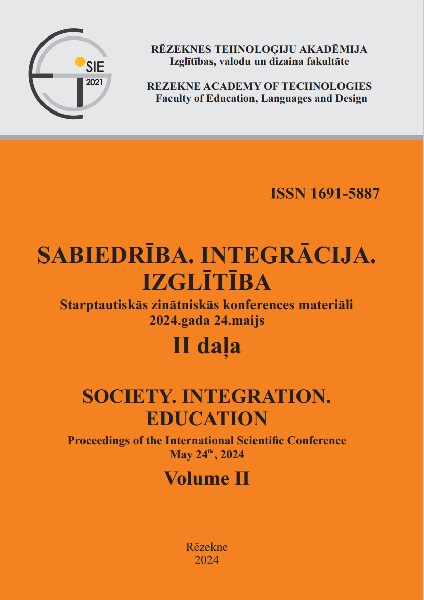INSUFFICIENT PHYSICAL ACTIVITY AND ITS IMPACT ON NATIONAL ECONOMY AND SECURITY
DOI:
https://doi.org/10.17770/sie2024vol2.7804Keywords:
economy, public health, security, sportAbstract
Healthy and active people not only strengthen the health of the population of Latvia, prolong life in good health, prevent premature mortality, but also make an important contribution to the economic development and security of the country. Unfortunately, Latvia ranks among the last places in a number of areas among the EU member states. Latvian Health and Fitness Association (LVFA) has adapted the “Deloitte Research” global study on the preventive impact of physical activity on the national economy to the circumstances in Latvia, revealing that the Latvian economy suffers significant losses every year due to physically inactivity among the population. Furthermore, insufficient physical fitness also affects the internal and external security of the country. Must be concluded also across the globe governments face rising healthcare costs and the increasing prevalence of lifestyle diseases. This raises questions as to how bet improve the health of populations, while keeping healthcare and security costs under control. The aim of the article is to study the impact of insufficient physical activity on the national economy and security, to recommend directions for policy development in this field, and to propose improvements of the legal framework. Analytical method, comparative method, as well as the method of qualitative and quantitative data analysis were used in the development of the article.
References
Alfejeva, A. (2018). Sporta jēdziens un tā attiecināšana uz prāta spēlēm. RSU elektroniskais juridisko zinātnisko rakstu žurnāls SOCRATES, 2(11), 81.-89.
Charness, G., & Gneezy, U. (2009). Incentives to Exercise. Econometric, 77(3), 909 - 933.
Ding, D., Lawson, K. D., Kolbe-Alexander, T. L., Finkelstein, E. A., Katzmarzyk, P. T., Van Mechelen, W., & Pratt, M. (2016). The economic burden of physical inactivity: a global analysis of major non-communicable diseases. The lancet, 388(10051), 1311-1324.
Economic Health & Societal Well-being: Quantifying the Impact of the Global Health & Fitness Sector Global Report. (2002). Deloitte, IHRSA, The Global Health & Fitness Alliance. Retrieved from: https://www.ihrsa.org/publications/economic-health-societal-well-being-quantifying-the-impact-of-the-global-health-fitness-sector/.
Ekonomiskā veselība un sabiedrības labklājība: Globālās veselības un fitnesa nozares ietekmes kvantificēšana – Latvija. (2023). Deloitte, IHRSA, Latvijas Veselības un fitnesa asociācija, 1-58.
Eurobarometer Report. (2022). Sport and Physical Activity. European Commission, 40. Retrieved from: https://europa.eu/eurobarometer/surveys/detail/2668.
European Sports Charter (2021). Recommendation CM/Rec (2021) 5 of the Committee of Ministers to member States on the Revised European Sports Charter. Adopted by the Committee of Ministers on 13 October 2021 at the 1414th meeting of the Ministers' Deputies. Article 2.
Hafner, M., Yerushalmi, E., Phillips, W.D., Pollard, J., Deshpande, A., Whitmore, M. Millard, F., Van Stolk, C&S. (2019). The economic benefits of a more physically active population: An international analysis. Santa Monica, CA: RAND Corporation. Retrieved from https://www.rand.org/pubs/research_reports/RR4291.html.
Health at the Glance. OECD indicators. (2023). OECD, 20. Retrieved from: https://www.oecd.org/health/health-at-a-glance/.
Iedzīvotāju zemā fiziskā aktivitāte negatīvi ietekmē Latvijas ekonomiku un drošību. (2023). LV portāls. Retrieved from: https://lvportals.lv/norises/353091-iedzivotaju-zema-fiziska-aktivitate-negativi-ietekme-latvijas-ekonomiku-un-drosibu-2023.
IHRSA 2023 Global Report. (2023). Retrieved from: https://www.ihrsa.org/publications/the-2023-ihrsa-global-report/#
Indrikovs, Z. (2004). Cilvēktiesības un profesionālisms policijas darbā. Cilvēktiesības un sabiedrības drošība: Starptautiskā zinātniski praktiskā konference. Rīga, LPA, 49.
Latvijas ekonomikas attīstības pārskats (2023). Ekonomikas ministrija. ISSN 2661–5061, 10.-12. Retrieved from: https://www.em.gov.lv/lv/media/18390/download?attachment
Latvijas izaugsmes modelis. Cilvēks pirmajā vietā. (2005). Apstiprināts ar Saeimas 2005.gada 26. oktobra lēmumu.
Latvijas Nacionālās sporta padomes nolikums. (2003). MK noteikumi Nr.422. Latvijas Vēstnesis, 111, 06.08.2003.
Militārā dienesta likums. (2002). Latvijas Vēstnesis, 91, 18.06.2002.; Latvijas Republikas Saeimas un Ministru Kabineta Ziņotājs, 14, 25.07.2002.
Nacionālās drošības koncepcija. (2019). Latvijas Vēstnesis, 197, 27.09.2019.
Oksleids, K. & Bolheimers, D. (2000). Olimpiskās spēles. Enciklopēdija. Zvaigzne ABC.
Sporta likums. (2002). Latvijas Vēstnesis, 165, 13.11.2002.; Latvijas Republikas Saeimas un Ministru Kabineta Ziņotājs, 23, 12.12.2002.
Sporta politikas pamatnostādnes 2022.–2027. gadam. (2022). Latvijas Vēstnesis, 107, 03.06.2022. OP numurs: 2022/107.7
Task Force on Community Preventive Services. Recommendations to increase physical activity in communities. TFCPS. (2002). Am J Prev Med. 2002 May;22(4 Suppl):67-72.
Valsts policijas vecākā virsnieka profesijas standarts. (2022). Profesionālās izglītības un nodarbinātības trīspusējās sadarbības apakšpadomes 2022.gada 14.decembra sēdē, protokols Nr.7






